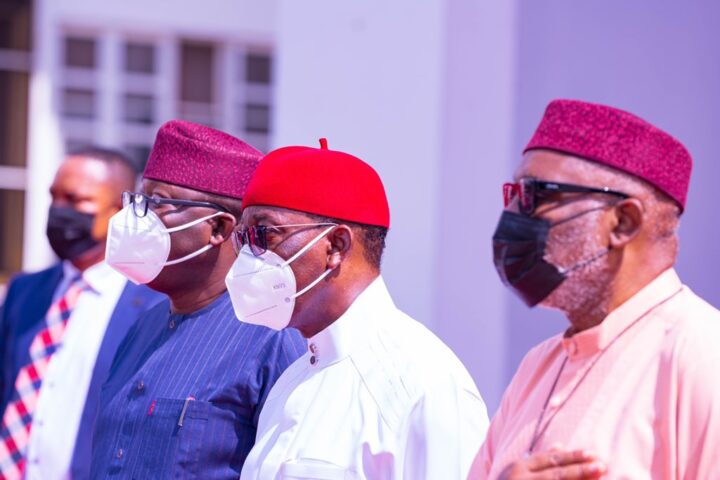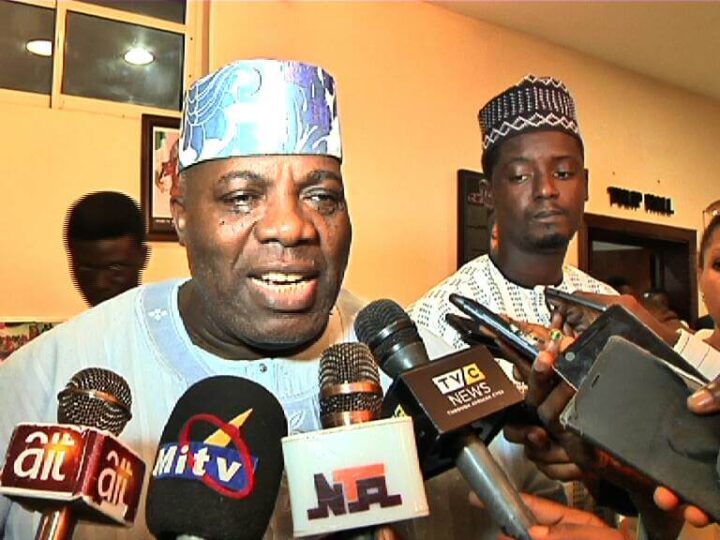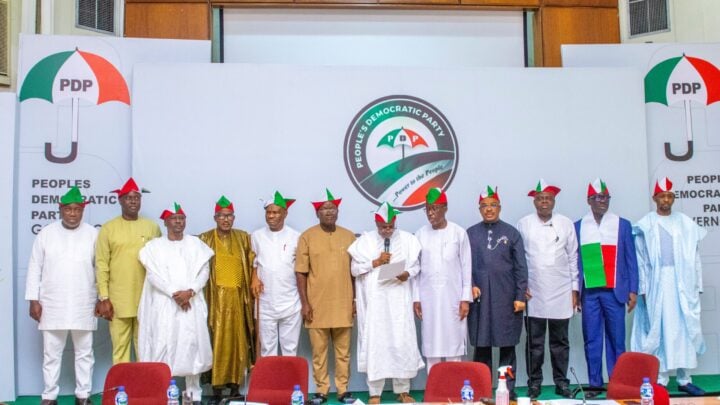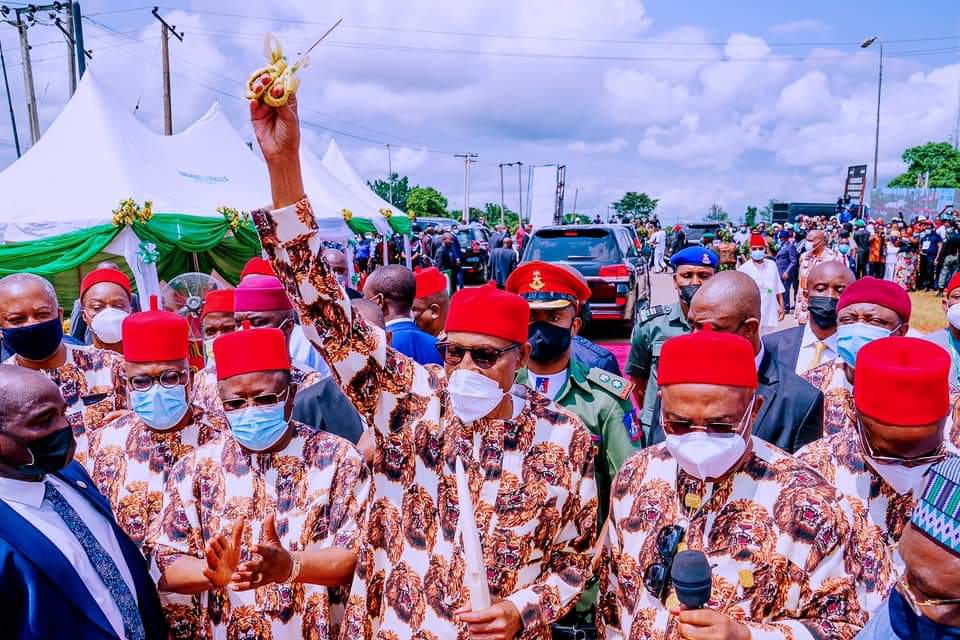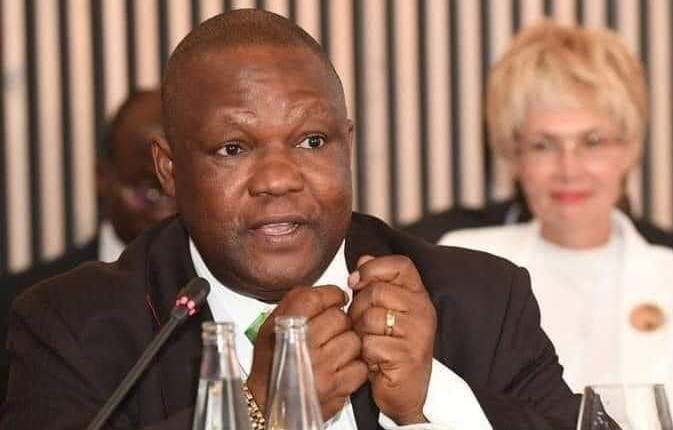Come to think of it, I have spent the past 18 years campaigning for restructuring, although not along ethnic lines. My campaign has been three-fold: (1) restructuring our mentality so that we can see the errors of our ways and begin to apply our hearts to wisdom (2) restructuring our politics to deliver good governance through competent and patriotic leadership (3) restructuring the economy to deliver prosperity, peace and justice to ordinary Nigerians — northerners and southerners alike. My tiny faction of the restructuring movement thinks Nigeria has two basic divides: the oppressors and the oppressed. These divides cut across all ethnicities, age groups, genders, religions and regions.
Undoubtedly, when you strip all my articles naked, these three propositions will always stare you in the face. But while restructuring the Nigerian mindset is one hell of a job — so many of us have been programmed from birth to view every single national issue through the prism of ethnic and sectional sentiments — we can always hope to make progress, no matter how slight, in our demand for good governance and economic prosperity. That is why I pray the VAT crisis would not be allowed to waste. It affords our leaders an opportunity to put heads together and work out how we can restructure our public finance to tackle the perennial crises and the accompanying political tensions.
Nigeria can be easily classified as a “rentier state” — originally defined by Hossein Mahdavi, an Iranian economist, as a country that receives “on a regular basis substantial amounts of external economic rent”. In our case, oil money is the external economic rent. This contrasts with a “fiscal state” which is run largely on revenues raised from domestic tax payers. Norway is oil-rich but it is a fiscal state — the bulk of government expenditure is raised from taxes. Norway’s oil revenue is saved in a sovereign wealth fund. Part of it is devoted to specific interventions in education and health care — not presidential jets, Prado SUVs, ultra-modern government houses and duty tour allowances.
We need a radical reappraisal of public finance in Nigeria. We spend money without thinking. We have carried on for too long thinking more about how to spend money, reflecting less on how to raise revenue — largely because of the seasonal oil windfalls. A modern state cannot build its finances on oil windfalls and hand-outs. The revenue base must be well established, reliable and predictable. For every new project, the state must work on raising extra revenue — either by cutting down expenditure elsewhere or adjusting a tax rate to raise the funds. For instance, to increase funding to its public health service, the UK recently raised the employee national insurance rates.
Advertisement
Conversely, a rentier state embarks on projects hoping that another windfall is just around the corner. Nigeria’s budget is eternally benchmarked against crude oil price. That tells the whole story. If oil price rises, government doubles the wage bill, builds new airports and Nigerians go on an importation binge. If oil price falls, we begin to owe salaries, abandon projects and start throwing even the kitchen sink at saving the naira. Any economy built around the prices of commodities, such as crude oil, is a fickle economy. Ours is even worse because we do not save — we keep eating the oil money, sometimes borrowing with the hope that we will pay back when crude prices rise again.
The vulnerabilities of public finance in Nigeria hardly feature in public discourse. Our emotions are elsewhere. As things stand, 35 of the 36 states are parasites on oil. Take away the oil revenue and only Lagos has a chance of surviving. It is the only state that currently makes more from IGR than from federation allocation. Also, if oil-producing states keep the petrodollars, no fewer than 30 states will struggle to survive. It is the sharing of the oil revenue that stabilises the finances of states. Until federation allocation becomes mere “pocket money” to states and IGR becomes the real deal, we will continue brawling over the national cake. We all need to wake up and smell the coffee.
The good news is that most states are viable. I have heard many people argue that most Nigerian states are not viable. That is true — if all that matters in this world is federation allocation. As I pointed out years ago, Luxembourg, a European country, has a landmass of 2,586.4 square kilometres — half of Toro LGA, Bauchi state. With a population of 600,000, Luxembourg has fewer people than Oshodi-Isolo LGA, Lagos state. But its GDP, built on industry, agriculture and banking services, is $72 billion. That is more than the combined GDP of Lagos, Rivers and Delta states, Nigeria’s top three states by GDP ranking. Countries are developed by brains, not allocation.
Advertisement
The bad news is that this fact never sinks into our heads — no matter how many times we hear it per second. Luxembourg would not exist today if viability were determined by natural resources. Banking services form the largest sector of the economy — Luxembourg is one of the world’s most competitive financial centres. The country also manufactures steel. Its farmers are producers and exporters of meat, dairy products and wine. Anytime I think about the possibilities Nigeria sits on in every sector and in every region, my heart breaks to pieces. We have too much potential to be living this beggarly life. We are suffering basically because we are a sheepfold without the right shepherds.
But the good news again: with most states now seeing their vulnerability without VAT redistribution, there is a slight chance that this might ignite what I generously tag “fiscal revolution” — by which I mean a new thinking on how we can radically improve IGR by using the existing tax handles. As I advocated last week, it is not about instituting new taxes. We already have enough tax handles in my opinion. I would also not suggest increasing the tax rates. I believe the rates are generally fair and should remain so for now. Rather, the fiscal revolution can be achieved by (1) improving state capacity to ensure more compliance (2) expanding the local economy to enlarge the tax base.
In fiscal federalism terms, our current structure allows states to collect and retain personal income tax (PAYE and self-assessment) and withholding tax on certain rents, in addition to sundry levies. However, FG collects VAT, company incomes tax, petroleum profit tax, WHT, stamp duties, technology tax and tertiary education tax on behalf of the federation. All the tax revenues go into the federation pot, from where they are shared by the three tiers of government using a matrix that tries to ensure equalisation and stabilisation. Mineral-rich states take an extra 13% as derivation. Nevertheless, southerners often criticise the allocation formula which they say favours the north.
Irrespective of the outcome of the VAT dispute, the greatest thing that can happen to states, going forward, is for them to improve their IGR meaningfully. That is a tough job. It is very easy to say “improve your IGR” but it cannot happen overnight. While ensuring tax compliance can immediately raise the revenue, even if not massively, the economy of a state also needs to grow consistently before it can enjoy an enlarged and predictable revenue base. That will take a number of things to achieve: critical infrastructure, good security, creative policies and a number of productive incentives. I must of necessity acknowledge that many governors are not in the mood for this.
Advertisement
Why? It requires good thinking and hard work. It is not a champagne party. Most states are not creating the productive environment for business, so how can the local economy grow and broaden the tax base? According to the World Bank Ease of Doing Business 2018, it takes the whole of 118 days (four months) to get a building permit in Lagos. When it comes to having the title deed to a property, Ogun’s score of 82.9% is the only one above 50% among the 36 states. Getting a CofO is even worse: every state scored F9, with Lagos (22.9%), Kaduna (21.4%) and Adamawa (18%) being the best in class. These things hamper local economic growth and consequentially hurt the IGR.
There is good news, though. When Asiwaju Ahmed Bola Tinubu became governor of Lagos state in 1999, the IGR was N600m a month. When he was leaving in 2007, he had taken it to N6bn per month. No state was anywhere near that. Today, Lagos is averaging N34bn monthly. This is the closest example of a fiscal state. We can argue that Lagos enjoys an unusual advantage because it was federal capital and plays host to the ports, telecoms and financial services. But the IGR did not grow on its own. It was stimulated. I agree that every state will not move from N600m to N34bn like Lagos, but we must start working hard to move away from the comfort zone of federation allocation.
This should count as good news too: many states are making progress on the IGR issue. In 2020, for instance, NBS data showed that Kebbi grew its IGR by 87%, the highest in the federation, followed by Ebonyi (82%), Oyo (42%), Borno (42%), Katsina (34%), Gombe (26%), Taraba (24%), Zamfara (20%) and Plateau (16%). The naira and kobo may not be humongous yet but any progress is better than no progress. And to achieve fiscal prudence, states need to ask themselves: do we really need to build a cargo airport? Do we really need a new stadium? Do we really need a new university? Before increasing expenditure, they should ask: can we really afford this? Is this the best way to spend?
If all goes well, the ultimate benefit of fiscal revolution would be “fiscal social contract”. That is, the government feeling contractually obliged to deliver the goods to the citizens because it is their taxes, not oil money, that provide the bulk of the revenue. That way, the demand for accountability will be people-led and this should ordinarily impact on the quality of governance. The current rentier structure, built on oil windfalls, makes us treat public money as nobody’s money. We all want to take our share and run. Unfortunately, many theories fail in Nigeria. Even if tax revenue forms the bulk of public revenues, accountability may not be automatic. We just have to fight for it.
Advertisement
AND FOUR OTHER THINGS…
UNFEDERAL CHARACTER
The house of representatives on Thursday passed a resolution accusing President Buhari of violating the constitution in his appointments in the Federal Character Commission (FCC). The two top positions in the commission — chairman and secretary — are occupied by northerners. The commission is constitutionally mandated “to promote, monitor and enforce compliance with the principles of the proportional sharing of all bureaucratic, economic, media and political posts at all levels of government”. If the appointments into the Federal Character Commission itself do not reflect federal character, that would be ironic. I think we need a convincing explanation. Puzzling.
Advertisement
FURORE OVER FFK
Who helped popularise the tag, “clueless”, as a nickname for President Jonathan? Chief Femi Fani-Kayode. He had left PDP for APC at the time. FFK returned to PDP in 2014 to become spokesman for the same Jonathan in the 2015 presidential election. Having done tremendous work in the last six years to help classify APC as a party of almajiris and participated in “Jubrilising” President Buhari and defining the narratives around “Fulanilisation”, FFK was seen in Aso Rock on Thursday formally returning to APC. He attributed his decision to the “Spirit of God”. His embarrassed disciples are livid and have been raving mad at him. Me: what’s shocking about FFK jumping ship? Amusing.
Advertisement
RICE REWARD
The Kaduna police command paraded two suspects, named as Bashir Mohammed and Nasiru Balarabe, allegedly linked to the death of Abdulkarim, son of Senator Bala Na’Allah. Their reported confessions are so distressing. Abdulkarim, who was a pilot, had struggled with them at his Malali home. They overpowered him and they tied him with a rope, one of the suspects said. With him motionless, they went ahead to rob the apparently dead man. They said they stole his car and sold it for N1m. One of the suspects said he used his own share to buy 33 bags of imported rice but they were seized by Customs. The life of a human being wasted for a reward of 33 bags of rice. Sick.
Advertisement
BANDITS OR TERRORISTS?
There has been an interesting debate over the difference between bandits and terrorists. This, I would say, is a purely academic exercise. Whatever name they are called, the bandits are wreaking havoc on the country. Still, there is a distinction for whatever it is worth. Terrorists usually have a political demand. Bandits are purely out for the material gain without making any political demand. Boko Haram wants to establish an Islamic Caliphate. The bandits have not told us yet if they have a political ambition. However, both invoke fear and terror in people, and the increasing sophistication of the operations of bandits means we are not safe, whatever name we call them. Simple.
Add a comment

